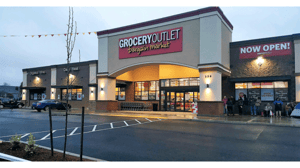Loblaw No Frills workers stave off strike with tentative contract dealLoblaw No Frills workers stave off strike with tentative contract deal
Accord with Unifor comes three days after union members set deadline for work stoppage at 17 Ontario stores.

Just days after announcing a strike deadline, Unifor has reached a tentative contract agreement with Loblaw Cos. for more than 1,200 workers at 17 of the Canadian retailer’s No Frills discount grocery stores in Ontario.
Unifor, Canada’s largest private-sector union, reported the tentative accord Sunday morning. Details of the pact will be released to members this week as they begin ratification votes, scheduled to be held Monday through Saturday.
“Workers made it very clear that they were ready to strike, if necessary, in order to achieve our necessary demands for decent work and pay,” Gord Currie, president of Milton, Ontario-based Unifor Local 414, which represents the No Frills workers, said in a statement on Sunday.
Brampton, Ontario-based Loblaw couldn’t immediately be reached by Winsight Grocery Business for comment on the tentative contract agreement.
On Thursday, Unifor said member No Frills employees at the 17 stores planned to strike at 12:01 a.m. on Nov. 20 if the union and Loblaw failed to come to an agreement. Workers sought upfront wage improvements to help address inflationary pressures, including higher grocery bills, as well as a commitment from Loblaw to increase the number of full-time jobs in stores, among other items.
“Loblaw must come to the table prepared to raise wages, improve working conditions and create more full-time jobs for these grocery store workers,” Unifor National President Lana Payne stated Thursday in announcing the No Frills workers’ strike deadline. “They deserve decent work and pay. It’s as simple as that.”
Both Payne and Currie noted that Unifor grocery members have been struggling with the higher cost of living brought by elevated inflation, while Loblaw has seen increased sales and earnings.
“Every single financial quarter, Loblaw posts higher profits than the last,” according to Payne. “It’s past time the workers helping them earn these profits get a share so they can support their own families.”
The same day that Unifor announced the strike deadline for the No Frills workers, Loblaw reported that fiscal 2023 third-quarter retail sales grew 5% to $17.98 billion (Canadian), with same-store sales rising 4.5% for the food retail segment and 4.6% for its Shoppers Drug Mart retail pharmacy segment. E-commerce sales climbed 13.6% year over year. Q3 net income came in at $621 million ($719 million adjusted), or $1.95 per diluted share ($2.26 adjusted), up from $556 million ($663 million adjusted), or $1.69 per diluted share ($2.01 adjusted), a year earlier. In a conference call Thursday on Q3 results, Loblaw Chief Financial Officer Richard Dufresne told analysts that the company’s hard discount grocery banners, which include No Frills, “continue to outperform, delivering higher traffic, increased tonnage and market-share growth.” (Call transcript provided by AlphaSense.)
“Loblaw workers are fed up with the out-of-control disparity between their wages, the company's enormous profits and high cost of living. Workers are prepared to take necessary action to support themselves and their families during these challenging times,” Currie commented in the strike deadline announcement. “It’s ultimately up to Loblaw to avert a strike and do the right thing to support its workers and customers,” he added.
Union officials point to recent Metro contract
In announcing the tentative agreement for the No Frills workers, Payne cited the contract that Unifor attained with Metro Inc., which in early September reopened 27 supermarkets in greater Toronto following a 32-day work stoppage by 3,700 grocery workers represented by Unifor Local 414.
The Metro contract ratification vote came over a day after Metro and Unifor reached a tentative agreement. Local 414 members had walked off the job on July 29 at Metro stores in 13 Toronto-area communities after voting down a tentative contract accord reached July 19. The union local had set a strike deadline of 11:59 p.m. on Sept. 17 in the event that no contract agreement was reached. Weeks earlier, on June 20, union members had voted unanimously to authorize a strike against Metro, nearly a week before bargaining was scheduled to begin.
For the striking Metro workers, Unifor said it was able to obtain significant upfront wage gains, improved benefits and pensions, better scheduling and job safeguards with the deployment of self-checkout stations.
“Our bargaining committee at No Frills was determined to build on what grocery store workers had achieved this past summer with Metro,” Payne stated on Sunday. “This tentative agreement delivers pattern wages and many other improvements for our members.”
Unifor represents over 11,000 frontline grocery store workers at Canada’s biggest grocery retailers—Loblaw Cos., Sobeys Inc./Empire Co. Ltd. and Metro Inc.—in Ontario, Newfoundland, Labrador, Nova Scotia and Quebec. At the end of May, Unifor had announced that over the next two years it would be engaged in collective bargaining to renew more than a dozen contracts with the “big three” grocers, starting with Metro.
Strike authorization votes have proven effective for Unifor and United Food and Commercial Workers (UFCW) in contract talks with Canadian grocers. Last month, three UFCW locals in Western Canada ratified new collective bargaining agreements (CBAs) with Loblaw and Sobeys. All three of the locals—UFCW Local 832 (Winnipeg, Manitoba), UFCW Local 1518 (New Westminster, British Columbia) and UFCW Local 247 (Surrey, British Columbia)—described the CBAs as historic.
About the Author
You May Also Like






